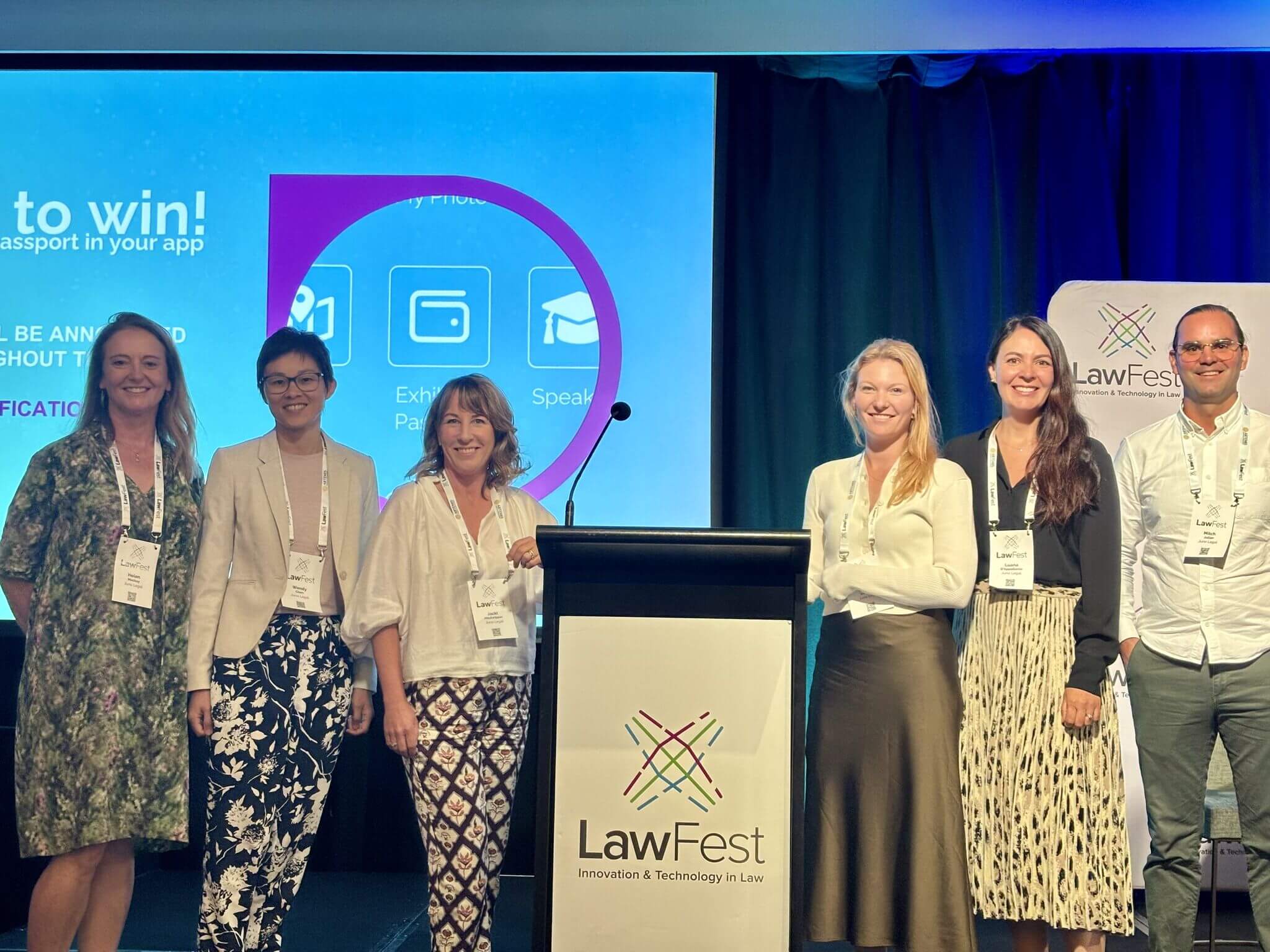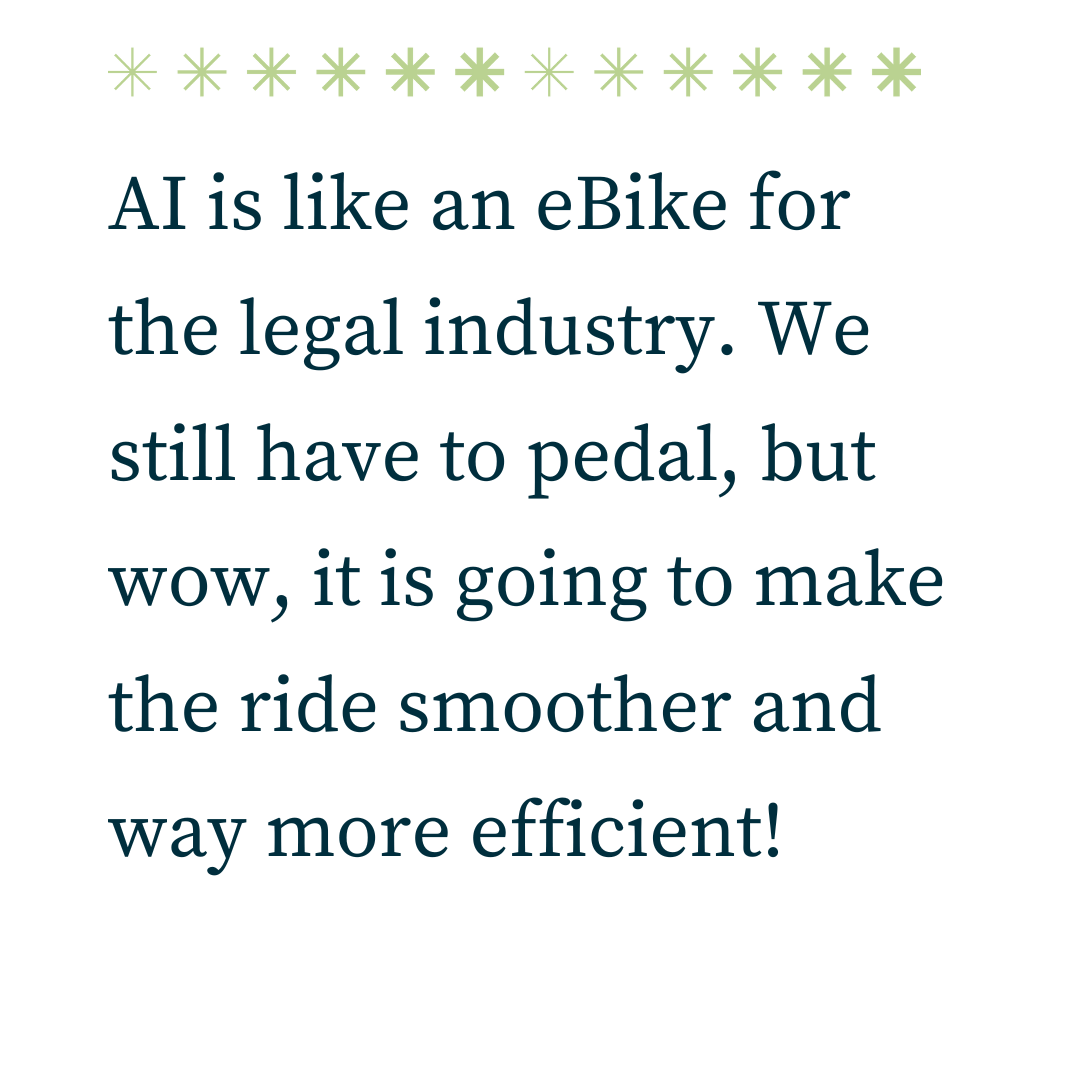The AI conversation at LawFest has come a long way. A few years ago, it was about potential: how AI might change the legal profession? Now, the message is clear: Lean into AI - fully and fast.
The team captured insights from the team at LawFest 25, where AI dominated the discussion. Technology is racing ahead, and the real advantage lies with lawyers who use it well while staying adaptable, curious, and connected to the human side of law.

The Juno team had an absolute blast at LawFest 25, and if you haven’t been yet, do yourself a favour and set a reminder for next year. Between the brilliant speakers, incredible tech demos and thought generation within the room, it was clear why this is NZ’s leading legal innovation and technology conference.
So, what did we learn? Lean into AI – fully and fast - and don’t forget to keep the human touch. AI might be taking over, but it can’t replace what makes us human….at least not yet.
AI: The word of the day
Unsurprisingly, AI stole the spotlight. It’s no longer just a buzzword – it’s here, evolving at an unimaginable pace and it’s not going anyway. As one speaker put it (quoting Justin Trudeau), “The pace of change has never been this fast, yet it will never be this slow again”. The message was loud and clear: lawyers who embrace AI will thrive; those who resist will be left behind.
If you’re still hesitant about diving into AI, consider this your nudge. Imagine a world where AI handles the boring admin work, leaving lawyers free to focus on really matters – strategy, advocacy and actually making a difference. Well, that world is here, giving us the opportunity to focus on things that drove us to be lawyers in the first place.
Supercharging the legal profession – But are we ready?
AI is here to turbocharge the legal profession – so why are so many lawyers still hesitant to jump on board? It can increase our productivity exponentially, with one speaker referring to a study that found Gen AI boosts knowledge worker productivity by 30-40% (Harvard/Wharton). So, you’d think we’d all be racing to adopt it, right? Well, not quite.
Frances Valintine, Founder and Board Director of AcademyEx, pointed to a Thomson Reuters report that showed while 84% of lawyers are comfortable using AI for drafting basic legal documents, only 4% think it should be trusted to represent clients in court or make final decisions. But why the hesitation? Valintine posed a thought-provoking question – shouldn’t defendants have access to the best, most comprehensive legal insights available? When framed like that, it’s difficult to justify why they shouldn’t.
Can AI and lawyers co-exist?
AI is moving fast. So, should lawyers start looking for back-up careers? Perhaps take a barista course? Not so fast.
While AI is changing the way we work, it’s not here to kick lawyers to the curb. Nick Abrahams, Futurist & Global Head of Digital Transformation Practice at Norton Rose Fulbright, had a great analogy – AI is like an eBike for the legal industry. We still have to pedal, but wow it is going to make the ride smoother and way more efficient! Rather than drowning in admin tasks, lawyers will have more time to focus on high-value work – the things that truly make a difference.
And AI isn’t stopping at more basic tools like Copilot and ChatGPT. More specialised AI solutions are really taking off, focussing on contract review and lifecycle tools and eDiscovery for litigation, as just the starting point.
And here’s the good news: AI can’t replace the human touch. Skills like relationship management, curiosity, and empathy? Those are staying and remain critical to success. A great example – LawPath saw massive growth when it introduced real lawyers into its solution – proving that human expertise is skill a key value proposition, even in an AI-driven world.
empathy? Those are staying and remain critical to success. A great example – LawPath saw massive growth when it introduced real lawyers into its solution – proving that human expertise is skill a key value proposition, even in an AI-driven world.
Honing those irreplaceable human skills
AI can’t take over everything. Those soft skills that make us human? These are still vital.
In fact, as one speaker mentioned, the World Economic Forum’s Future of Jobs Report (2025-30) identifies core human skills - including resilience, empathy and curiosity – as essential to success.
Kate Dillon, Founder and Director of the She Lion Group and Walk Fearlessly Consulting, shared her experience of building up her business and brand, and how she needed to lean into her own core competencies to achieve success, stressing upon the importance of remaining curious, challenging your own perspectives and how to drive momentum. Pro tip: Find yourself a “pirate partner” - someone who will challenge those perspectives you falsely tell yourself are true that are holding you back.
Peter Connor’s T-shaped lawyer model showed how lawyers need to branch out beyond legal knowledge into broader business skills – becoming deeply integrated into business operations to allow for well-rounded strategic input. Fiona McLay of McLay Legal Consulting also gave some solid advice on how the ability to adapt and think strategically is key to driving change within organisation – you need to adapt your approach to target your specific audience, otherwise you’ll be met with resistance.
Bottom line: those who hone their human skills will be set up for success, even in the AI world.
Challenges for the legal industry – A changing business model
While AI presents incredible opportunities, it’s also throwing some curveballs. Two big issues popped up on the panel discussions:
1) The evolution of the billable hour
As AI takes over tasks like e-discovery (which used to take junior lawyers HOURS or even all-nighters), law firms need to rethink traditional billing practices. One speaker even pointed out that some clients are already demanding lower bills due to AI efficiencies. Clearly, it’s time to reassess how law firms deliver value.
2) Training the next generation of lawyers
With AI handling the routine tasks that junior lawyers used to learn on, how will they ever become trusted advisers? Traditional methods like shadowing senior partners might not be enough. A mix of universities, law firms and AI training solutions will be key to preparing the next generation. Still, how exactly will that look? TBD.
Ngā mihi nui, a huge thank you to Andrew King and the LawFest team, all the incredible speakers, panellists, and the innovative tech businesses who shared their insights and showcased cutting-edge solutions. Your expertise and energy made this event both inspiring and thought-provoking!
The key to success? Lean into AI, sharpen those irreplaceable human skills, and stay adaptable. The legal profession isn’t disappearing - it’s evolving.
See you at LawFest 2026. Who knows what the future will look like by then?